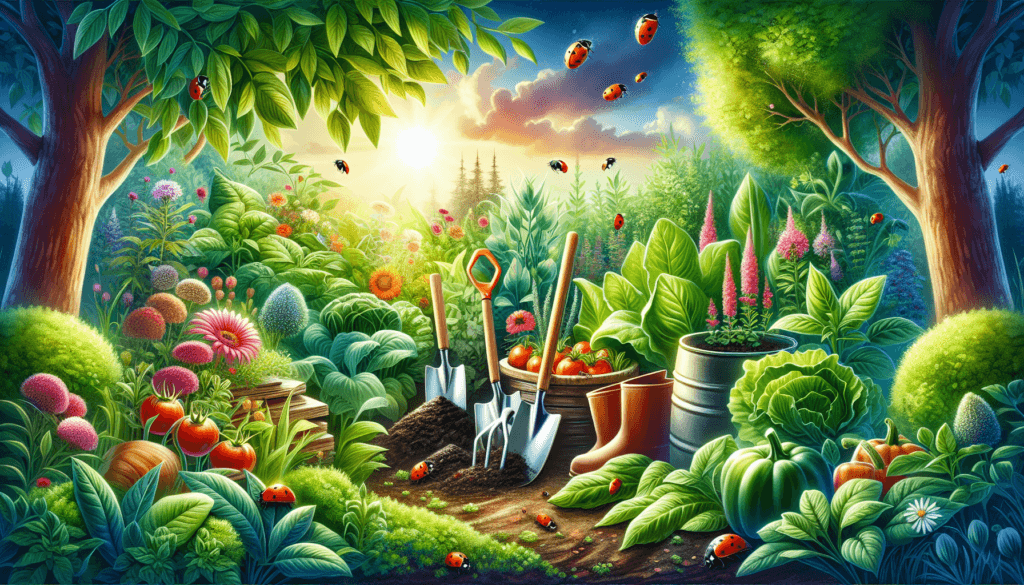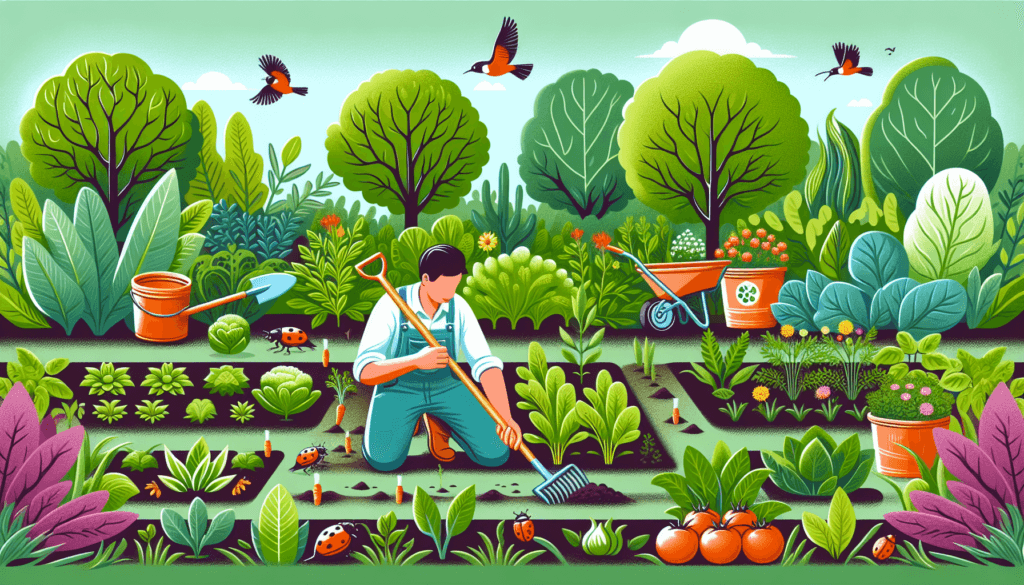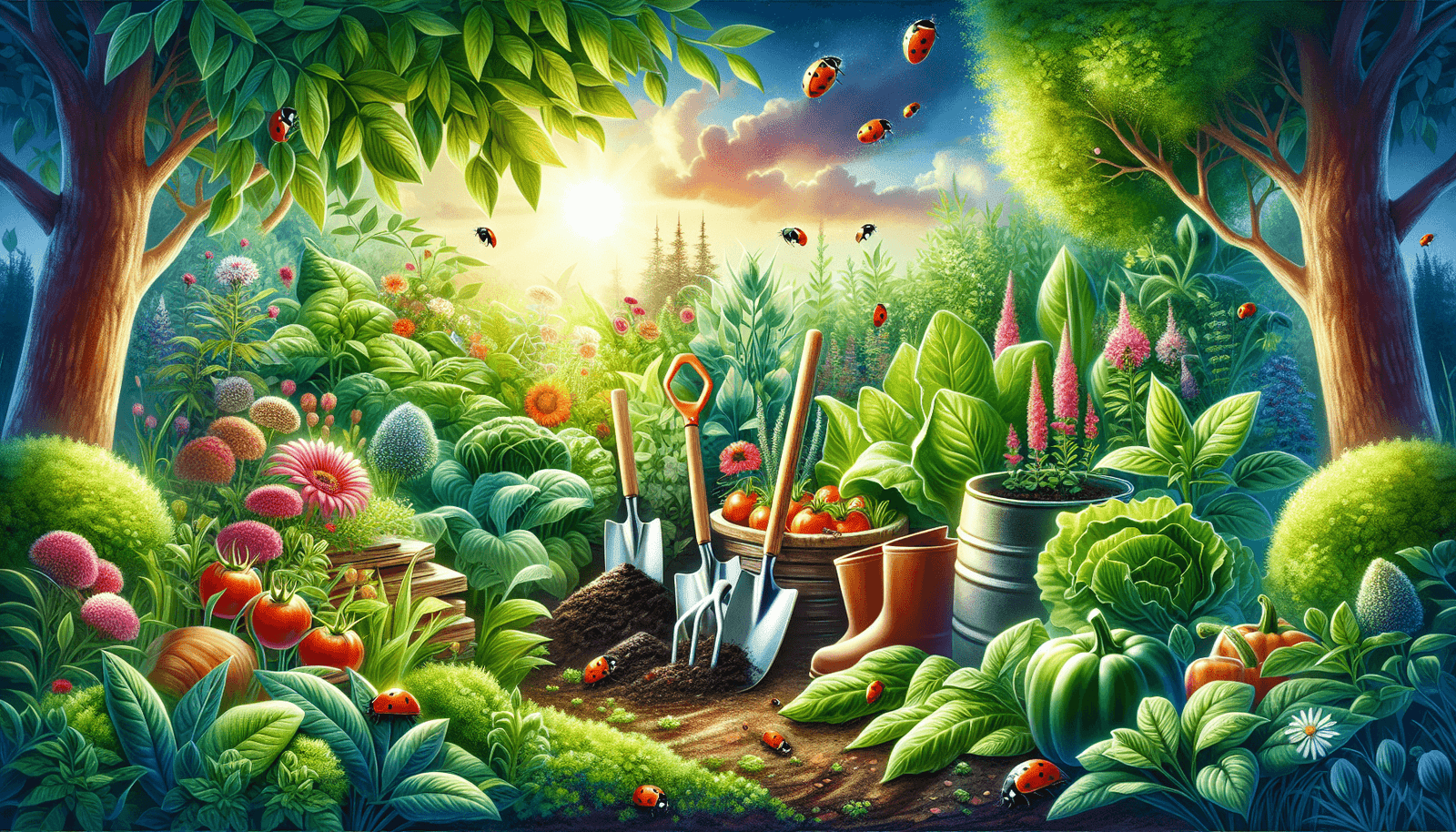Are you a passionate gardener looking for ways to minimize chemical usage in your garden? Look no further! In this article, we will explore some of the best techniques and practices that you can adopt to create a healthier and more environmentally-friendly garden space. From using natural fertilizers and organic pest control methods to implementing sustainable watering techniques, these tips will not only help you reduce chemical usage but also promote a thriving, vibrant garden that you can be proud of. So, let’s get started on this journey towards a greener garden together!
Choose Native Plants
Benefits of Native Plants
When creating a garden, one of the best ways to reduce chemical usage is by choosing native plants. Native plants are those that naturally grow in your region and have adapted to the local climate, soil conditions, and pests. By selecting native plants, you are selecting species that are well-suited for your garden and require less maintenance and chemical intervention to thrive.
There are numerous benefits to planting native plants in your garden. Firstly, native plants are more adapted to your local climate, which means they are more tolerant of extreme weather conditions such as droughts or heavy rains. They have evolved to handle these conditions and, therefore, require less water and additional irrigation.
Additionally, native plants have developed resistance to local pests and diseases over time. This natural resistance makes them less susceptible to these issues, reducing the need for chemical pesticides. By choosing native plants, you can significantly decrease the need for harmful chemicals in your garden and create a balanced and thriving ecosystem.
Adaptability and Resistance to Pests
One of the key advantages of native plants is their adaptability to local conditions, including resistance to pests. Native plants have co-evolved with local insects and animals, creating a delicate balance in the ecosystem. Through this co-evolution, native plants have developed natural defense mechanisms against common pests, making them more resistant to infestations.
When you choose to plant native species, you are essentially inviting natural pest control into your garden. Native insects, birds, and beneficial organisms have developed a relationship with these plants, relying on them for food and shelter. By providing these natural predators with their preferred habitat, you encourage them to thrive and help control pest populations naturally.
By planting native plants, you not only reduce the need for chemical pesticides but also promote the conservation of local wildlife. Birds, bees, butterflies, and other pollinators greatly benefit from the presence of native plants, ensuring their populations remain healthy and sustainable. Thus, choosing native plants is a win-win situation, benefiting both your garden and the environment.
Practice Crop Rotation
Definition and Importance of Crop Rotation
Crop rotation is a practice where different crops are grown in succession on the same piece of land, ensuring that the same crop is not planted in the same area year after year. This technique helps to disrupt the life cycles of pests and diseases by confusing and weakening them.
Crop rotation is crucial in reducing chemical usage in your garden because it helps prevent the build-up of pests and diseases. When the same crop is grown in the same location for multiple seasons, pests and diseases specific to that crop can accumulate in the soil, leading to increased infestations and the need for chemical intervention.
By rotating crops, you break these cycles and reduce the likelihood of persistent pests and diseases. Different plant families have different vulnerabilities, so rotating crops helps to minimize the impact of specific pests on a particular crop. This practice also improves soil health, promotes nutrient cycling, and reduces the dependency on chemical fertilizers.
Preventing Pest and Disease Build-up
Crop rotation plays a vital role in preventing the build-up of pests and diseases in your garden. When you rotate crops, pests and diseases that have overwintered in the soil or plant residues are left without their preferred host and food source. This disruption breaks their life cycles and weakens their populations, reducing the need for chemical pesticides.
Another benefit of crop rotation is that it helps balance the nutrient demands of different crops. Certain plant families, such as legumes, have the ability to fix nitrogen from the air into the soil, enriching it for subsequent crops. By rotating crops, you can naturally replenish nutrients, making chemical fertilizers less necessary.
By adopting crop rotation in your garden, you can achieve healthier plants, reduce the risk of pests and diseases, and minimize chemical usage. It is an effective and sustainable method to maintain a balanced ecosystem and promote the long-term health of your garden.

Encourage Natural Predators
Introduction to Natural Predators
In any garden, there is a delicate balance between pests and their natural predators. By encouraging natural predators, such as beneficial insects, birds, and amphibians, you can reduce the need for chemical pest control methods.
Beneficial insects, like ladybugs, lacewings, and parasitic wasps, are natural enemies of garden pests. These helpful insects feed on aphids, caterpillars, and other destructive pests, keeping their populations in check. By attracting and providing habitat for these beneficial insects, you can create a natural pest control system in your garden.
Birds also play an important role in pest management. Many birds feed on insects and can significantly reduce pest populations in your garden. Creating bird-friendly spaces, such as birdhouses, birdbaths, and providing food sources, will attract these feathered friends and encourage them to make your garden their home.
Amphibians, such as frogs and toads, are natural predators of insects, slugs, and snails. By creating a welcoming environment for these amphibians, with suitable water sources and places to hide, you can effectively control pests without resorting to harmful chemicals.
Creating Habitats and Providing Food Sources
To encourage natural predators in your garden, it is essential to create habitats and provide food sources for these beneficial creatures. Incorporating diverse plants that offer nectar, pollen, and seeds will attract beneficial insects and birds, providing them with the sustenance they need to thrive. Native plants are particularly effective in attracting and supporting local wildlife.
In addition to plants, consider adding features like birdhouses, bat boxes, insect hotels, and small ponds to create diverse habitats for beneficial species. These additions provide shelter, nesting opportunities, and breeding sites for natural predators, ensuring they stay in your garden to help control pests.
Reducing the use of chemical pesticides is key to attracting and maintaining a balanced ecosystem. Pesticides not only harm harmful pests but also kill beneficial insects, disrupting the natural balance. By creating a welcoming environment for natural predators, you can effectively manage pests without harming the environment or compromising the health of your garden.
Improve Soil Health
Importance of Healthy Soil
A healthy garden starts with healthy soil. Soil health is vital for the overall well-being of your plants and their ability to resist pests and diseases. By improving the soil in your garden, you can create a conducive environment for plant growth and significantly reduce the need for chemical interventions.
Healthy soil provides plants with essential nutrients and minerals, supports root development, improves water infiltration, and promotes beneficial microbial activity. These factors contribute to the overall vigor and resilience of your plants, making them less susceptible to pest attacks.
Additionally, healthy soil helps retain moisture, reducing the need for excessive watering. When the soil is well-structured and rich in organic matter, it has better water-holding capacity, keeping your plants adequately hydrated without the use of synthetic irrigation methods.
Composting and Mulching
To improve soil health, composting and mulching are two highly effective practices. Composting involves the decomposition of organic matter, such as food scraps, yard waste, and plant debris, into nutrient-rich compost. Adding compost to your soil improves its structure, fertility, and water-holding capacity, creating an ideal environment for plant growth.
Mulching, on the other hand, involves covering the soil surface around plants with organic materials like wood chips, straw, or leaves. Mulch acts as a protective barrier, helping to retain moisture, control weed growth, regulate soil temperature, and improve overall soil health. Mulch also breaks down over time, contributing to organic matter levels in the soil and further enriching it.
By incorporating composting and mulching into your gardening routine, you can enhance soil health, reduce the need for chemical fertilizers, promote beneficial microbial activity, and overall, create a thriving ecosystem in your garden.

Implement Integrated Pest Management
Understanding Integrated Pest Management (IPM)
Integrated Pest Management (IPM) is an approach to pest control that focuses on minimizing the use of chemicals by combining multiple strategies and techniques. IPM aims to manage pest populations at acceptable levels while minimizing harm to the environment and human health.
The key principles of IPM include identifying pests and monitoring their population levels, implementing preventative measures, using biological control methods, and employing targeted chemical treatments only when necessary. By integrating these various strategies, gardeners can effectively manage pests while minimizing chemical interventions.
Steps to Implement IPM
Implementing IPM involves several steps that can help reduce chemical usage in your garden. The first step is to correctly identify pests and monitor their populations. Regular scouting and observation will help you assess the extent of pest damage and determine appropriate action levels.
Next, focus on preventative measures to reduce pest pressure. These measures include practicing good sanitation, selecting pest-resistant plant varieties, implementing physical barriers like row covers, and using cultural methods such as crop rotation and companion planting.
Biological control methods can be employed as part of IPM to introduce natural enemies that target specific pests. This can include releasing predator insects or parasitic wasps that feed on problem insects. These natural predators contribute to maintaining a balance in your garden and help reduce the need for chemical pesticides.
If pest populations exceed acceptable levels, targeted chemical treatments can be employed. However, it is essential to choose pesticides that have low toxicity to non-target organisms and follow label instructions carefully to minimize their impact on the environment.
By adopting IPM practices, you can effectively manage pests in your garden while minimizing chemical usage. This approach is environmentally friendly, promotes long-term sustainability, and helps maintain a healthy and balanced ecosystem in your garden.
Use Organic Fertilizers
Benefits of Organic Fertilizers
Opting for organic fertilizers is another effective way to reduce chemical usage in your garden. Organic fertilizers are derived from natural sources, such as compost, manure, bone meal, or seaweed, and supply a range of essential nutrients to your plants without the harmful effects of synthetic fertilizers.
One of the main benefits of organic fertilizers is that they improve soil health and fertility over time. Organic matter-rich fertilizers, like compost, enhance soil structure and moisture retention, promote beneficial microbial activity, and stimulate earthworms and other soil organisms that contribute to nutrient cycling.
Organic fertilizers also release nutrients slowly and steadily, providing a long-lasting source of nutrition for your plants. This slow-release characteristic reduces the risk of fertilizer runoff, which can harm water bodies and contribute to pollution.
Types of Organic Fertilizers
There are various types of organic fertilizers available, each with its own nutrient profile and specific benefits. Compost, as mentioned earlier, is an excellent all-around organic fertilizer that adds organic matter, improves soil structure, and provides a range of nutrients.
Manure is another commonly used organic fertilizer, particularly well-suited for enriching the soil with nitrogen. Chicken, cow, horse, and rabbit manure are readily available options, and their nutrient content varies slightly depending on the source. It is essential to let manure age or compost it properly to minimize the risk of pathogen contamination.
Bone meal is rich in phosphorus and calcium, making it beneficial for promoting root development and flowering in plants. It is often used when planting bulbs or other plants that require a nutrient boost during the initial stages of growth.
Seaweed and fish emulsion are organic fertilizers that provide a range of essential nutrients, including potassium, trace minerals, and growth-promoting compounds. They are particularly useful for promoting plant vigor, improving disease resistance, and enhancing overall plant health.
By using organic fertilizers in your garden, you provide your plants with the necessary nutrition they need to thrive, while minimizing the risk of chemical contamination and nutrient imbalances.

Mulching Techniques
Mulching Benefits
Mulching is an essential technique that offers multiple benefits in your garden, including reducing the need for chemical interventions. By applying a layer of organic mulch to the soil surface, you can improve soil health, conserve moisture, control weeds, regulate soil temperature, and minimize the risk of pest and disease infestations.
One of the primary benefits of mulching is its ability to conserve moisture in the soil. Mulch acts as a protective barrier, reducing water evaporation from the soil surface and helping to retain moisture around the plant roots. This moisture retention reduces the need for excessive watering, conserves water resources, and promotes water-efficient gardening.
Mulch also plays a crucial role in weed control. The layer of mulch prevents sunlight from reaching weed seeds, inhibiting their germination and growth. This natural weed suppression reduces competition for resources between weeds and your desirable plants, thereby reducing the need for herbicides.
Another advantage of mulching is its ability to regulate soil temperature. Mulch acts as insulation, keeping the soil cooler during hot summer months and warmer during colder periods, providing optimal growing conditions for your plants. This temperature moderation can help improve the overall health and productivity of your garden.
Types of Mulch and Application Techniques
There are several types of mulch available, each with its own set of characteristics and benefits. Organic mulches, such as wood chips, straw, leaves, grass clippings, or compost, are the most commonly used. These materials break down over time, enriching the soil with organic matter and nutrients.
Inorganic mulches, like gravel, stones, or landscape fabric, provide long-lasting weed control and regulate soil temperature. However, they do not enrich the soil with organic matter like organic mulches.
When applying mulch, it is important to follow proper techniques for maximum effectiveness. Start by clearing the area of weeds and debris. Apply a layer of mulch approximately 2-4 inches thick around your plants, ensuring you leave a small gap around the stems to prevent rot or disease. Take care not to pile the mulch directly against the plant stems.
Periodically replenish the mulch layer as it breaks down over time. This maintenance ensures consistent weed control, moisture retention, and overall effectiveness of the mulching technique.
By incorporating mulching into your gardening routine, you can significantly reduce the need for chemical interventions, promote optimal plant growth, and create a healthier and more sustainable garden environment.
Watering Techniques
Effective Watering Practices
Watering your garden effectively is essential for plant health and reducing chemical usage. Proper watering techniques ensure that your plants receive enough moisture without wasting water or promoting the development of fungal diseases.
One of the key principles of effective watering is to water deeply and less frequently. To encourage deep root growth and drought tolerance, it is important to water your plants thoroughly, allowing the water to penetrate the deeper layers of the soil. This encourages plants to develop deeper roots, making them less dependent on frequent watering.
Watering in the early morning is the most effective time, as it allows moisture to reach the plant roots before the heat of the day. Watering in the evening or at night can leave the foliage wet for extended periods, promoting fungal diseases. Additionally, watering during the peak heat of the day can lead to excessive evaporation and water waste.
Monitoring soil moisture is crucial to avoid over or underwatering. A simple way to test soil moisture is to stick your finger or a garden tool into the soil to a depth of a few inches. If the soil feels dry, it’s time to water. However, if the soil feels moist, it’s best to wait before watering again.
Drip Irrigation and Rainwater Harvesting
Drip irrigation is an efficient method of watering that minimizes water waste and promotes optimal plant hydration. This technique involves placing a network of tubes or hoses with small emitters directly at the base of plants, delivering water slowly and directly to the root zone.
Drip irrigation is advantageous as it allows water to be delivered precisely where it is needed, minimizing water loss through evaporation or runoff. This targeted approach also reduces weed growth, as the water is not sprayed over the entire garden surface.
Another way to reduce water consumption and promote ecological responsibility is through rainwater harvesting. Collecting rainwater through rain barrels or larger water storage systems allows you to use natural, untreated water for your garden. Rainwater is free from chemicals, has a balanced pH, and is ideal for watering plants.
Rainwater harvesting not only reduces your reliance on municipal water sources but can also save you money on water bills. By using rainwater, you minimize the consumption of treated water, conserving this valuable resource for other purposes.
By adopting effective watering practices, such as deep watering and utilizing drip irrigation or rainwater harvesting, you can reduce water waste and the need for chemical interventions in your garden. This environmentally friendly approach promotes plant health, conserves water, and ensures long-term sustainability in your garden.

Companion Planting
Definition and Benefits of Companion Planting
Companion planting is a gardening technique where different plant species are grown in close proximity to mutually benefit each other. By strategically pairing specific plants, you can enhance growth, deter pests, increase pollination, and improve overall garden health.
One of the main benefits of companion planting is pest control. Certain plants emit natural compounds or fragrances that repel specific pests, helping to protect neighboring plants. For example, planting marigolds among your vegetables can deter aphids, while planting basil near tomatoes can repel tomato hornworms.
Companion planting also promotes biodiversity, attracting beneficial insects and pollinators to your garden. By providing a variety of flowering plants, you create a diverse habitat that attracts bees, butterflies, and other beneficial insects. These pollinators play a crucial role in the reproduction of many plants, ensuring high fruit and vegetable yields.
Additionally, some plant combinations can enhance nutrient uptake or improve soil health. For example, legumes like beans or peas have the ability to fix nitrogen from the air into the soil. By planting them alongside nitrogen-demanding crops like corn or tomatoes, you can naturally boost soil fertility without relying solely on chemical fertilizers.
Successful Combinations and Examples
There are numerous successful plant combinations in companion planting that you can experiment with in your garden. Here are a few well-known examples:
- Planting onions or chives alongside roses can deter aphids and promote healthy growth.
- Interplanting carrots with onions or leeks can deter carrot flies while enhancing flavor.
- Growing nasturtiums or petunias near squash, beans, or cucumbers can deter squash bugs and cucumber beetles.
- Sowing dill or fennel near brassicas like cabbage, broccoli, or kale can attract beneficial insects that prey on cabbage worms or aphids.
- Pairing tall sunflowers with climbing beans or cucumbers can provide shade and support for these vining plants.
- Planting herbs like mint, rosemary, or thyme near brassicas or other plants can deter pests and provide aromatic benefits.
By practicing companion planting, you can create a harmonious and beneficial garden ecosystem. This technique reduces the need for chemical pesticides, improves pollination, enhances nutrient cycling, and adds visual interest to your garden.
Utilize Natural Pest Deterrents
Repelling Pests with Natural Methods
When it comes to pest control in your garden, there are various natural methods and deterrents that can help minimize damage without relying on chemical interventions. These natural pest deterrents use organic and environmentally friendly techniques to repel pests and protect your plants.
One popular natural pest deterrent is the use of strong-smelling herbs and plants. For example, planting mint or garlic near susceptible crops can repel pests like aphids, beetles, or ants. The strong scent of these plants acts as a natural repellent, making your garden less attractive to pests.
Many pests are deterred by certain textures or shapes. For example, slugs and snails dislike crawling over rough surfaces. Placing crushed eggshells or coarse sand around plants can create barriers that slugs and snails will avoid. Similarly, pests like caterpillars or beetles are deterred by spiky or fuzzy plants. Planting flowers like marigolds or lamb’s ear can help keep these pests at bay.
Natural predators and beneficial insects can also be introduced to your garden to help control pest populations. For example, ladybugs feed on aphids and other soft-bodied insects, while praying mantises are highly effective at capturing and eating a variety of garden pests. By providing a safe habitat and food sources for these beneficial insects, you can encourage their presence and pest control activities.
Examples of Natural Pest Deterrents
There are several natural pest deterrents you can incorporate into your garden to reduce the impact of pests without resorting to harmful chemicals. Here are a few examples:
- Planting marigolds, nasturtiums, or petunias amongst your vegetable garden can deter a wide range of pests, including aphids, whiteflies, and nematodes.
- Placing aluminum foil or reflective surfaces around plants can deter birds and other animals that may cause damage or feed on fruits or vegetables.
- Spraying diluted neem oil or soap solution on plants can help control many common pests, including aphids, mites, and mealybugs.
- Cultivating strong-smelling herbs like basil, thyme, or rosemary can repel mosquitoes or other biting insects, making your outdoor spaces more enjoyable.
By utilizing these natural pest deterrents, you can reduce the use of chemical pesticides and create a healthier and more sustainable garden environment. These methods allow you to protect your plants and enhance their growth while minimizing harm to the environment and beneficial insects.
By incorporating these various practices and techniques into your gardening routine, you can significantly reduce chemical usage, promote a balanced ecosystem, and create a thriving and sustainable garden. Choosing native plants, implementing crop rotation, encouraging natural predators, improving soil health, adopting integrated pest management, using organic fertilizers, mulching, practicing effective watering, companion planting, and utilizing natural pest deterrents are all effective strategies to minimize your reliance on harmful chemicals and create a healthier and more environmentally friendly garden. Remember, a little extra effort and consideration can go a long way in preserving the beauty and vitality of your garden while minimizing the negative impact on the environment.



